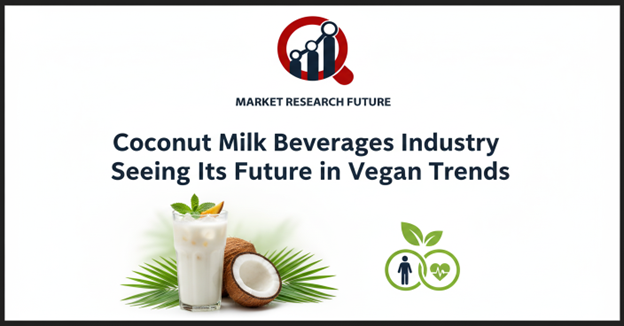Coconut Milk Beverages Industry Seeing It’s Future in Vegan Trends

Coconut Milk Market Overview
The global food and beverage industry is undergoing a major transformation as consumers increasingly shift toward plant-based, vegan, and lactose-free alternatives. Among these, coconut milk beverages have emerged as a frontrunner, gaining widespread popularity for their nutritional benefits, creamy texture, and versatile applications. Once a niche ingredient in tropical cuisines, coconut milk has now entered mainstream markets across the U.S., Europe, and Asia, reshaping consumer preferences and product portfolios.
According to market insights, the global coconut milk beverages market is expected to witness robust growth through 2030, driven by rising health consciousness, the growing vegan population, and innovation in non-dairy beverages. With consumers seeking clean-label, allergen-free, and functional drinks, coconut milk is increasingly viewed as a sustainable and ethical alternative to traditional dairy.
What is Coconut Milk?
Coconut milk is a plant-based liquid extract derived from the grated meat of mature coconuts. Unlike coconut water, which is naturally found inside young coconuts, coconut milk is produced by pressing or blending coconut flesh with water, resulting in a rich, creamy beverage. It serves as a dairy-free alternative commonly used in beverages, desserts, curries, sauces, and baked goods.
Rich in medium-chain triglycerides (MCTs), healthy fats, and essential nutrients such as potassium and magnesium, coconut milk supports heart health, weight management, and digestive wellness. It also appeals to lactose-intolerant and vegan consumers seeking a natural source of energy and flavor.
Key Benefits of Coconut Milk Beverages
- Vegan & Lactose-Free Alternative – Ideal for individuals avoiding dairy due to allergies, ethical reasons, or dietary preferences.
- Rich Nutritional Profile – Contains MCTs, potassium, and essential minerals with lower cholesterol levels compared to cow’s milk.
- Digestive Comfort – Known to reduce bloating and improve gut health compared to dairy-based drinks.
- Functional Versatility – Used in smoothies, coffee, cooking, and packaged beverages.
- Sustainable Choice – Plant-based sourcing supports environmental conservation and ethical consumption.
Market Growth Drivers
The coconut milk beverages market is expanding rapidly due to a combination of consumer trends and industry dynamics:
- Rise of Veganism & Flexitarian Diets – Growing global adoption of plant-based lifestyles.
- Health & Wellness Awareness – Increased demand for natural, allergen-free, and nutrient-rich beverages.
- Innovation in Non-Dairy Products – Expansion of coconut-based creams, yogurts, and ready-to-drink beverages.
- Clean Label Movement – Preference for additive-free, organic, and minimally processed ingredients.
- Sustainability Focus – Ethical sourcing and eco-friendly packaging gaining traction.
Challenges
Despite growing popularity, the market faces certain constraints:
- Higher Cost – Coconut-based products remain premium-priced compared to traditional dairy.
- Additives and Quality Variance – Some commercial variants contain stabilizers or preservatives, raising concerns among clean-label consumers.
- Limited Awareness in Developing Regions – Lower availability and understanding outside urban centres.
Addressing these through transparent labelling, affordable pricing, and consumer education will be critical for broader adoption.
Regional Insights
- North America: The U.S. leads the global market, with increasing availability across retail shelves and rising adoption among health-conscious consumers.
- Europe: Markets like the U.K., Germany, and France are witnessing a surge in plant-based beverage consumption driven by vegan trends and regulatory support.
- Asia-Pacific: Countries like Thailand, Indonesia, and the Philippines, major producers of coconuts, are key supply hubs, while demand is rising in China, Japan, and Australia.
- Latin America: Growing consumer interest in functional beverages is fueling adoption in Brazil and Mexico.
- Middle East & Africa: Emerging markets show gradual uptake due to urbanization and rising disposable incomes.
Future Outlook
The future of the coconut milk beverages market is shaped by innovation, sustainability, and consumer awareness. As plant-based diets continue to mainstream, coconut milk will play a pivotal role in redefining the global beverage landscape. With continuous product development—such as fortified coconut beverages, barista blends, and flavoured variants—manufacturers are poised to capture new demographics and expand into untapped regions.
Conclusion
Coconut milk beverages represent more than just a dairy substitute—they symbolize a global movement toward conscious consumption. Combining health benefits, ethical sourcing, and versatility, they are set to become a staple in modern diets. As the world embraces vegan and sustainable living, coconut milk stands out as a key driver of the plant-based revolution, offering a delicious and nourishing path toward a more balanced future.

Leave a Comment